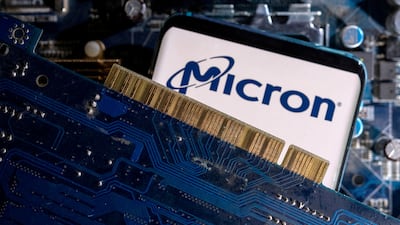China delivered the latest salvo in an escalating semiconductor war with the US, announcing that Micron Technology products have failed to pass a cybersecurity review in the country.
On Sunday, Beijing warned operators of key infrastructure against buying the company’s goods, saying it found “relatively serious” cybersecurity risks in Micron products sold in the country.
The components caused “significant security risks to our critical information infrastructure supply chain,” which would affect national security, said the Cyberspace Administration of China.
This come more than a month after China announced an investigation of imports from America’s largest memory chip maker.
The tech sector has become a key battlefield over national security between the two largest economies – with Washington having already blacklisted Chinese tech firms, cut off the flow of sophisticated processors and banned its citizens from providing certain help to the Chinese chip industry.
The US Commerce Department said Beijing’s conclusion had “no basis in fact” and Washington will continue to try to limit industry disruptions with its allies.
Shares in Micron’s biggest industry rivals, Samsung Electronics and SK Hynix, gained in Seoul. Chinese chip stocks including sector bellwethers Semiconductor Manufacturing International and Hua Hong Semiconductor climbed more than 3 per cent in Hong Kong.
“No one should understand this decision by CAC as anything but retaliation for the US’s export controls on semiconductors,” said Holden Triplett, founder of Trenchcoat Advisors and a former FBI counter-intelligence official in Beijing.
The move brings fresh uncertainty to the other US chipmakers that sell to China, the world’s biggest market for semiconductors.
Companies like Qualcomm, Broadcom and Intel deliver billions of chips to the country, which puts the components inside electronic products that are shipped all over the world.
US President Joe Biden voiced optimism about the China relationship on Sunday at the end of the G7 summit in Japan. He said he expected ties between the two countries will start to “thaw very shortly”.
The Chinese cyber agency said in its statement on Sunday that, while the country welcomes products and services provided by companies of all countries as long as they comply with its laws and regulations, the investigation into Micron products are a “necessary measure” to safeguard national security.
It didn’t detail what the security risks were or identify specific Micron products that are now barred.
Micron, which has previously said it stood by the security of its products and commitments to customers, said on Sunday that it’s evaluating the conclusion of the review.
The company is assessing its next steps, adding that it looks forward “to continuing to engage in discussions with Chinese authorities”.
Analysts at Jefferies including Edison Lee said in a research report that the CAC’s decision will likely have a small impact on Micron because it focuses on “critical information infrastructure,” meaning operations like data centres and cloud computing services with security risks.
Most of Micron’s memory chips sold in China are actually used in consumer electronics, like smartphones and notebooks, they said.
“We believe this ban is narrowly focused as it applies to only CII operators,” they wrote. “Therefore, the ultimate impact on Micron will be quite limited.”
In the meantime, the Idaho-based chipmaker has been tightening ties with Japan. It’s poised to get about ¥200 billion ($1.5 billion) in financial incentives from the Japanese government to help it make next-generation memory chips in the country, Bloomberg has reported.
Japanese Prime Minister Fumio Kishida met last week with a delegation of chip executives, including Micron chief executive Sanjay Mehrotra.
Memory chips were already a flashpoint for US-China tensions. In December, Washington blacklisted Yangtze Memory Technologies, a state-backed flash memory maker in Wuhan, central China, effectively capping China’s capabilities in advanced 3D Nand-style chips.
YMTC had been in talks to supply the components to Apple for the iPhone before that development.
Micron is the last remaining maker of computer memory based in the US, having survived brutal industry downturns that forced larger rivals such as Intel and Texas Instruments to bow out.
The majority of Micron’s products are made to industry standards, meaning the chips can be easily swapped out with those of rival manufacturers, such as Samsung and Hynix. Those two South Korean chipmakers have plants in China.
Memory chips also aren’t usually considered a cybersecurity risk because they don’t require any specific software or run code. They’re mostly basic grids of transistors used for storing data and, as such, haven’t typically been a vector of attack for hackers.
Micron derived nearly 11 per cent of its revenue from mainland China in its last fiscal year. While that’s relatively low compared with other major tech firms, much of the world’s electronics production goes through Chinese factories in some way.
After a previous tussle, Taiwan’s United Microelectronics settled a suit in 2021 brought by Micron accusing it of stealing and leaking its intellectual property to a Chinese partner.
The case concerned an allegedly illegal transfer of Micron’s memory designs in a chip manufacturing deal between UMC and Jinjiang-based Fujian Jinhua Integrated Circuit.

